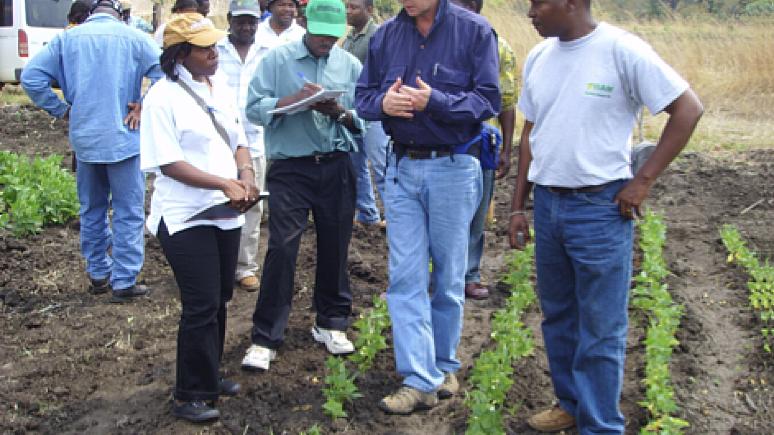Renowned professor of plant nutrition retires after long, influential tenure | Penn State University
UNIVERSITY PARK, Pa. – Jonathan Lynch, distinguished professor of plant nutrition, retired this fall after an innovative and influential 33-year career at Penn State’s College of Agricultural Sciences, focusing on research to reduce world hunger and improving crop production through subsistence farmers. in developing countries.
A faculty member in the Department of Plant Sciences who also served as founding director of the Center for Root and Rhizosphere Biology at the Huck Institutes of the Life Sciences, Lynch was among the top 1% of plant scientists cited in 2022, with more. 250 publications. He has also received more than $24 million in external financial aid at Penn State since 2007.
His website, which was available in three languages, boasted more than 50,000 visitors annually, and he trained or advised more than 100 graduate students and postdoctoral scholars. Lynch was a dedicated teacher, leading an advanced course in plant nutrition, encouraging undergraduates to conduct research in his laboratory.
“I realized early on that agricultural innovation is the key to the biggest challenge we face – how to sustain 10 billion people in a degraded environment,” he said. “That influenced my work for decades.”
Lynch’s lab conducted seminal research on plant nutrition and phosphorus and nitrogen acquisition, which established a clear link between root architecture and nutrient acquisition. He also studied drought tolerance in crops and the response of plants to salt and heavy metal toxicity. With the invention of laser ablation tomography, he discovered new ways to map anatomy in 3D.
His efforts to open phenotyping platforms for use in field-grown plants and to develop computer simulations to facilitate the analysis of behavioral patterns have advanced scientists’ understanding of how plants are how they respond to stress and nutrient availability. He and his colleagues identified new methods that are now common in breeding programs for crops such as beans, corn and soybeans, according to Erin Connolly, professor and head of the Department of Plant Sciences. .
He said: “Jonathan has had a long, incredibly productive and successful career in research and teaching. “His work has been groundbreaking and has changed our understanding of how plants are. adapts the root systems to adapt to the changing environment. He is an outstanding, award-winning scientist and is internationally recognized not only for his contributions to the field, but also for the tremendous impact this work has had on improving crop production in North America, Latin America and Africa.
“Lynch has been one of our most respected teachers and mentors,” Connolly added. “Without a doubt, his research, mentoring and teaching efforts leave an impressive legacy that will continue to be felt for years to come.”
Lynch excelled in commercial research – including numerous invention publications, patents and grant awards – to advance crop productivity and stress adaptation, with an eye to improving yield and crop safety. food. He was a top scorer who was named to 10 Penn State publications and is a two-time co-scorer with the staff from Wisconsin. Three of his patents were licensed and successfully sold by start-up companies.
“Jonathan’s work and influence is so powerful that he has not only made the world a better place, but has led, inspired and empowered those around him to make a positive difference in their own ways,” said Blair Siegfried, vice president of assistant research assistant. and graduate studies. “His positive impact on this world has been overwhelming.”
Lynch remembers noticing a food shortage in Africa caused by infertile tropical soil when he was 9 years old and deciding to take on the challenge, he said. As a result, he focused on plant nutrition as an undergraduate at the University of California, Berkeley, and in his graduate work at the University of California, Davis, where he conducted field research in Brazil. After receiving his doctorate, he headed the plant nutrition research program at the headquarters of the International Institute of Tropical Agriculture in Colombia, returning to the US to take a faculty position at Penn State in 1991.
Looking back on his career, Lynch says the focus of his research has been to understand how plants adapt to drought and poor soil quality, to guide the development of more resilient, productive crops.
He said: “In developing countries, such crops would be more productive, improve food security and economic development, while in rich countries such crops would reduce costs of goods and environmental degradation. “Improving drought tolerance is a global concern as drought is currently a major threat to crop production and is worsening due to global climate change.”
It quickly became clear to Lynch that the key to better crop growth in dry, infertile soils was better roots, and much of his research focused on understanding how root systems how can it be used in crop breeding. This included the discovery of specific root systems that improve stress tolerance, how they can be measured quickly in the field, genetic control, and the ecological effects of crops with improved roots in the agricultural environment.
The lessons led to the creation of new research tools, concepts and paradigms, numerous patents, two start-up companies led by Penn State undergraduates, and crops new ones with good stress tolerance and high yields are being cultivated in Africa, Asia and Latin America.
“This work was highly collaborative, involving many Penn State researchers and graduate students, as well as postdoctoral fellows and many colleagues around the world,” he said. “As I retire, I am happy to know that many of my colleagues are continuing this work to develop efficient, resilient crops that are urgently needed in global agriculture.”
Lynch noted that his wife, Kathleen Brown, Penn State professor emerita, was an important partner in his research and supported him throughout his career.
#Renowned #professor #plant #nutrition #retires #long #influential #tenure #Penn #State #University
